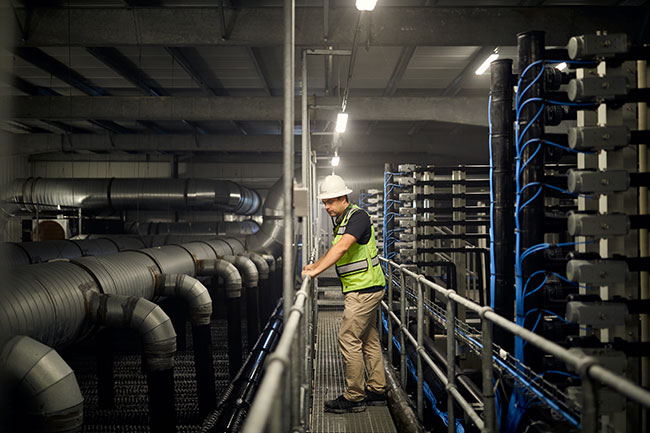
Features
Technology
Cleantech Canada
In-Depth
Power Struggle: Why the world needs RAS
January 4, 2023 By Maddi Badiola
 (Photo: Atlantic Sapphire)
(Photo: Atlantic Sapphire) It is obvious that we need to produce food in general, and RAS is the way and answer in aquaculture. However, in the current scenario of global change and uncertainty, it is difficult to predict how RAS fish producers are going to survive.
Many farms are shutting down due to high operational costs, mainly for feed ingredients that have tripled in price and energy supply costs for dwindling supply. Should not the governments do something? Could not the big energy players make the effort of decreasing their benefits by decreasing the energy prices?
It may make a tiny change for them but a huge one for the rest of us mortals. Energy prices are dictating the industry’s direction. Many projects are on stand-by while many others have decided not to proceed as the short-term future does not look bright at all (dark, I would say). It’s sad to see this happening.
Given the world’s current situation, I would like to make a case of why the recirculating aquaculture systems (RAS) industry is so important and why we should all support it – from engineers and consultants, to producers and consumers; passing through politicians, governments and the big players.
Reason 1 is that animal health and welfare are becoming more and more of a concern among consumers; not to mention that the number of vegans (and all the different derivatives) has tremendously increased in the last few years.
The poultry industry is a good example, although the same happens (or it is questioned) in the cattle and pig industries. The number of chickens that are held in a cage has been a topic of debate for a long time. Stocking densities could make the difference between a happy and an unhappy animal.
On the other hand, we have the debate of how we can produce more protein for our increasing population, when available land is finite and becoming more expensive.
In my opinion, the intensive way of production (within reason) is the way to go. I guess this is why I am a staunch defender of the RAS industry. Because unquestionably, RAS is synonymous with intensive. Nevertheless, and needless to say, the level of intensiveness must be in line, without compromising the welfare of the fish. This is both a systems design and operations management issue.
Reason 2, the aquaculture industry is a relatively new way of animal production. Therefore, it has been meticulously supervised and challenged from the beginning.
From ponds to cages, raceways using flow-through, and lately in-land tanks of recirculating water, these all make up a big picture of where we can produce fish.
I have seen tanks where I could hardly see the water due to the amount of fish per cubic metre. Was this farm aware of fish welfare? Were those fish happy? It’s hard to answer the question.
There was an interesting study published in July this year called “Finding the “golden stocking density: a balance between fish welfare and farmers’ perspective.” It turns out that based on reports from 30 companies in 12 different countries and visits to more than 50 farms rearing 24 species, there is no such thing as a golden stocking density.
In this study in Frontiers in Veterinary Science, the authors offered a small guide of management practices that emphasized extensive water quality checks and monitoring to determine the most suitable environmental strategies for each production application.
Without any doubt in my mind, RAS is the most suitable environment and technology to monitor to be able to have pertinent parameters visible at a glance. Though, it is necessary to mention that each RAS is still unique to its own context. The RAS theory is always beautiful and seems easy to apply but it is not.
Twelve years ago, I began my aquaculture career unintentionally. My passion, at the time, was in the wine sector. It still is, but I have become a huge advocate of the aquaculture industry and RAS technology. And I will spread the world to educate people about it.
I have taken up the responsibility of showing consumers what aquaculture is and everything involving it – from decreasing the burden from the oceans, to creating a great variety of products in the marketplace, from bio secure environments to embracing the circular economy with (nearly) zero waste production.
You will always hear me say my motto: farmed is the way, RAS the technology.
Food is crucial in our lives; it is human’s fuel. Food production is more technology-based than ever and this sector needs energy as fuel.
If the ones that should push the change do not do it, let’s do it ourselves. We must move off-shore aquaculture to in-land production. Let’s convert away from our dependency in non-renewable energy and create efficient and sustainable operations. This is how we can battle against the energy prices; how we can battle against the power brokers.
Maddi Badiola, PhD, PM, is a RAS engineer and co-founder of HTH Full Spectrum (fullspectrumaquaculture.com; HTHaqua.com) in Basque Country, Spain. Her expertise include energy conservation, lifecycle assessments and RAS global sustainability assessments. Email her at mbadiolamillate@gmail.com.
Print this page